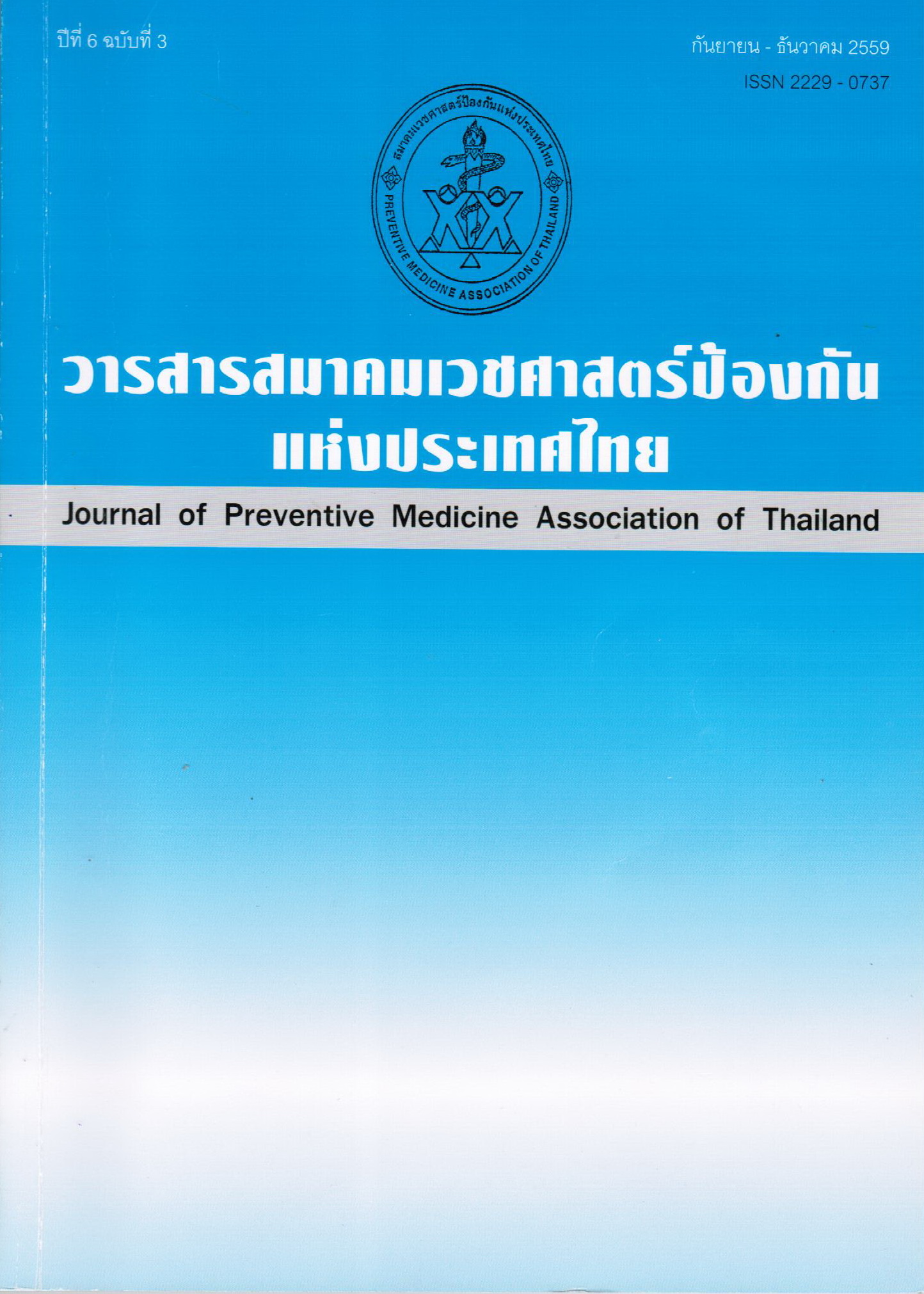The Effectiveness of the Process of Developing the Life Quality of the Elderly under the Sufficiency Economy: A Case Study Lom Kao District, Phetchabun Province
Keywords:
Quality of life, Sufficient economyAbstract
Most of elderly have encountered with problems that affect their well-being and quality of life. An important care for elderly is enabling seniors to have good quality of life. The idea of applying the learning process in improving the quality of life for the elderly under the sufficiency economy. The purpose of this experimental research was to study the effectiveness of the learning process in improving the quality of life for the elderly in Lom Kao district, Phetchabun Province. Sixty of elderly in Lom Kao district, Phetchabun province were purposively selected to an experimental group (30 samples) and a control group (30 samples). Selected a specific sample (Purposive Sampling) of Elderly 60 years old and over, Can speak well, Perfectly sensible and willing to participate in the study. The experimental group was joined by the group learning program.; The control group was given the program taught the usual manner. Data were collected before and after program implementation using aquestionnaire with 3 sections: general information, the application of the principles of the sufficiency economy philosophy (reliability=.77) and Quality of life of the elderly (reliability=.84). Statistics applied for data analysis included frequency, percent, mean, standard deviation, paired t-test, and independent t-test.
The results found that: 1) For an experimental group, after program implementation, mean scores of the sufficiency economy philosophy, and Quality of life of the elderly were significantly higher than those before program implementation. 2) After participating in the participatory learning program, the sufficiency economy philosophy of an experimental group were higher than those a control group statistically significant at the 0.05 level. No statistically significant difference for the social and cultural issues. Quality of life of the elderly of an experimental group were higher than those a control group statistically significant at the 0.05 level, except in issues of being in a good temper and interpersonal relationships, no statistically different found.
This study suggests that health authorities and other relevant agencies should apply group learning process to guide the application of the principles of the sufficiency economy philosophy that is the guidelines for developing the life quality of the elderly under the sufficiency economy in Phetchabun province and other provinces tobe a quality senior.
References
2. วิพรรณ ประจวบเหมาะ. โครงสร้างระบบการติดตามและประเมินผลแผนผู้สูงอายุแห่งชาติ ฉบับที่ 2 (พ.ศ. 2545-2564). จุฬาสัมพันธ์ (วารสารออนไลน์) วันจันทร์ที่ 8 มีนาคม 2553;53(9). วันที่ค้นข้อมูล 8 สิงหาคม 2559. แหล่งข้อมูล : https://www.research.chula.ac.th/cu_online/2553/vol_9_l.html/.
3. Dupuis K, Kousaie S, Wittich W, and Spadafora P. Aging Research Across Disciplines: A Student-Mentor Partnership Using the United Nation Principles for Older Persons. Journal of Educational Gerontology. 2007; 33(4): 273-292.
4. สำนักงานคณะกรรมการพัฒนาการเศรษฐกิจและสังคมแห่งชาติ. แผนพัฒนาเศรษฐกิจและสังคมแห่งชาติ ฉบับที่ 10 (พ.ศ. 2549-2554). กรุงเทพฯ: คุรุสภา ลาดพร้าว; 2549.
5. สุพร คูหา. แนวทางการปรับปรุงคุณภาพชีวิตผู้สูงอายุของเทศบาลตำบลหนองขาว อำเภอท่าม่วง จังหวัดกาญจนบุรี. (รายงานการศึกษาอิสระปริญญารัฐประศาสนศาสตรมหาบัณฑิต) สาขาวิชาการปกครองท้องถิ่น วิทยาลัยการปกครองท้องถิ่น. บัณฑิตวิทยาลัย. ขอนแก่น: มหาวิทยาลัยขอนแก่น; 2552. (เอกสารอัดสำเนา)
6. สำนักงานสาธารณสุขจังหวัดเพชรบูรณ์. สรุปผลการสรุปการดำเนินงานผู้สูงอายุจังหวัดเพชรบูรณ์ ปี 2559. เพชรบูรณ์: กลุ่มงานส่งเสริมสุขภาพ สำานักงานสาธารณสุขจังหวัดเพชรบูรณ์; 2559.
7. สิงหา จันทริย์วงษ์. รายงานการวิจัยการพัฒนารูปแบบที่เหมาะสมสำหรับคุณภาพชีวิตผู้สูงอายุในชนบทโดยใช้ครอบครัวเป็นศูนย์กลาง. สุรินทร์: สถาบันวิจัยและพัฒนา มหาวิทยาลัยราชภัฏสุรินทร์; 2551. (เอกสารอัดสำเนา)
8. Kelly B. Older and Wiser. U.S. News & World Report 2010; 147(2): 4.
9. จิราพร เกศพิชญวัฒนา. ความรุนแรงในผู้สูงอายุความจริงที่สังคมไทยคาดไม่ถึง. [อินเตอร์เน็ต] วันที่ค้นข้อมูล 4 กรกฎาคม 2559. แหล่งข้อมูล: ttp://www.thaihealth.or.th/node/12511/
10. ศากุล ช่างไม้. สังคมไทยกับสถานการณ์ผู้สูงอายุในปัจจุบันและอนาคต. กรุงเทพฯ: มติชน; 2550.
11. สุวดี เบญจวงศ์. ผู้สูงอายุ คนแก่และคนชรา: มิติทางสังคมและวัฒนธรรม. มนุษยสังคมสาร มหาวิทยาลัยราชภัฏหมู่บ้านจอมบึง 2551; 1(1): 54-60.
12. วโรทัย โกศลพิสิษฐ์กุล. ความเหลื่อมล้ำด้านรายได้และศักดิ์ศรี. มติชนรายวัน. 2550; 30(1077): 6-7.
13. วิชาญ คงธรรม. Active learning และ passive learning ส่งผลต่อผู้เรียนต่างกันมาก. วันที่ค้นข้อมูล 15 พฤษภาคม 2558 แหล่งข้อมูล: https://www.e-manage.mju.ac.th/MISDocRef_19032557160248_OnFizeNiNizezeegFiTRFiOnSx%20(1).pdf
14. ศรีไพร ปอสิงห์ และ อนงค์ หาญสกุล. ประสิทธิผลการเรียนรู้แบบมีส่วนร่วมต่อความรู้และพฤติกรรมการดูแลตนเองของผู้สูงอายุ ตำบลหนองบัวโคก อำเภอจตุรัส จังหวัดชัยภูมิ. วารสารสำนักงานป้องกันควบคุมโรคที่ 6 ขอนแก่น; 2555; 19(1): 39-53.
15. John WB. Research in Education. New Jersey: Prentice Hall; 1970.
16. Polit DF and Hungler BP. Nursing Research: Principles and Methods (6th ed.). Philadelphia: J.B. Lippincott; 1999.
17. กรมสุขภาพจิต สำนักพัฒนาสุขภาพจิต. คู่มือจัดอบรมแบบมีส่วนร่วม. กรุงเทพมหานคร: วงศ์กมลโปรดักชัน จำากัด; 2543.
18. Walker SN, Sechrist KR and Pender NJ. The health promoting lifestyle profile; development and psychometric characteristics. NURS RES. 1987; 36(2) :76-81.
19. Best JW. Research in Education. 3nd. New Jersey : Prentice Hall; 1977.
20. สุพร คูหา. แนวทางการปรับปรุงคุณภาพชีวิตผู้สูงอายุของเทศบาลตำาบลหนองขาว อำาเภอท่าม่วง จังหวัดกาญจนบุรี. (รายงานการศึกษาอิสระปริญญารัฐประศาสนศาสตร์มหาบัณฑิต). สาขาวิชาการปกครองท้องถิ่น วิทยาลัยการปกครองท้องถิ่น บัณฑิตวิทยาลัย. ขอนแก่น: มหาวิทยาลัยขอนแก่น; 2552. (เอกสารอัดสำเนา)
21. วลัยพร นันท์ศุภวัฒน์ และคณะ. โครงการพัฒนาคุณภาพชีวิตผู้สูงอายุ. มหาสารคาม: คณะพยาบาลศาสตร์ มหาวิทยาลัยมหาสารคาม; 2548.
22. บังอร ธรรมศิริ. ครอบครัวกับการดูแลผู้สูงอายุ. วารสารการเวก. 2549; ฉบับนิทรรศการวันเจ้าฟ้าวิชาการ: 47-56.
23. Odebode OS. Participation of elderly women in community welfare activities in Akinyele local government, Oyo State, Nigeria. Australian Journal of Adult Learning. 2009; 49(3):591-609.
24. กระทรวงมหาดไทย. ยุทธศาสตร์การส่งเสริมเศรษฐกิจพอเพียง เพื่อแก้ไขปัญหาความยากจน ปี 2548-2551. กรุงเทพฯ: กรมการพัฒนาชุมชน; 2548.
25. พจนา ศรีเจริญ. ปัจจัยที่มีความสัมพันธ์กับคุณภาพชีวิตผู้สูงอายุในสมาคมข้าราชการนอกประจำการในจังหวัดเลย. (วิทยานิพนธ์สาขาสังคมศาสตร์เพื่อการพัฒนา). เลย: สถาบันราชภัฏเลย; 2548. (เอกสารอัดสำเนา).
Downloads
Published
How to Cite
Issue
Section
License
บทความที่ลงพิมพ์ในวารสารเวชศาสตร์ป้องกันแห่งประเทศไทย ถือเป็นผลงานวิชาการ งานวิจัย วิเคราะห์ วิจารณ์ เป็นความเห็นส่วนตัวของผู้นิพนธ์ กองบรรณาธิการไม่จำเป็นต้องเห็นด้วยเสมอไปและผู้นิพนธ์จะต้องรับผิดชอบต่อบทความของตนเอง






